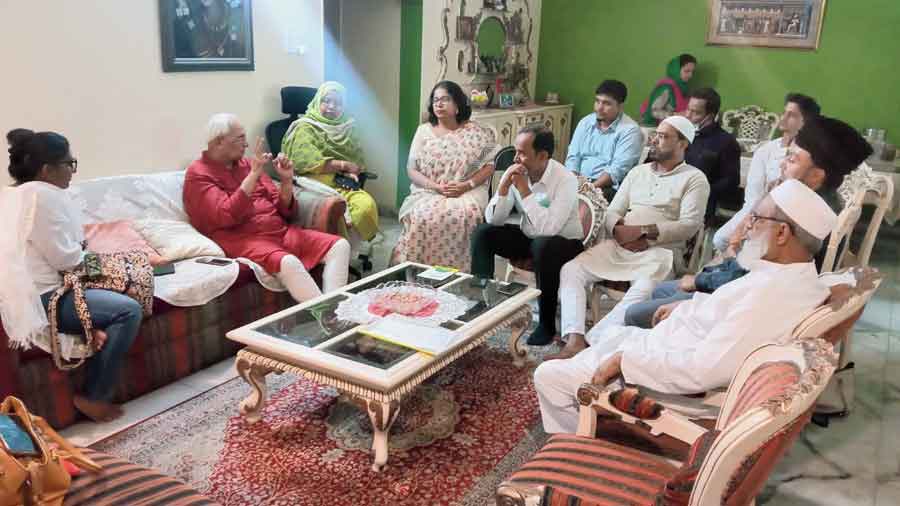Of the many iftars across the city during Ramazan, one in Ballygunge stands out. An 80-year-old man, Hindu by birth, has been hosting the iftar for the past three decades.
The spread is vegetarian, like the food habits of the host.
Every year, people from various walks of life, both Muslims and non-Muslims, attend the iftar where they engage in a freewheeling chat on the state of the affairs of the country.
The host, Om Prakash Shah, is a chartered accountant by profession and a peace activist by passion.
A staunch Gandhian, Shah is the founder of the Centre for Peace & Progress.
“I host this every year because I strongly believe secularism is not a choice but an absolute necessity for the unity of a large country like India. Secularism has to be maintained in letter and spirit. All of us should take part in others’ customs and festivals,” Shah told The Telegraph at his apartment on Friday, the date for this year’s iftar.
The venue of the iftar was Shah’s first-floor apartment on Nazar Ali Lane, a bylane off Ballygunge Circular Road and a stone’s throw from Tivoli Court.
The guests included a teacher, a lawyer, social activists and several others.
Abdul Aziz, the secretary of the Forum for Democracy and Communal Amity, explained the essence of Ramazan. “It is a time for self-restraint. Only fasting is not enough. We have to permanently discard falsehood and tyranny,” he said.
Zahid Mahmood, lawyer and activist, spoke of the fear and pain among Indian Muslims. “From hijab to halal to loudspeakers and azaan, a new issue is being raked up every day to corner Muslims. People are talking about genocide, threatening to kills Muslims, not in underground meetings but at open gatherings in broad daylight,” he said.
On Friday, another video emerged on social media. It showed a man in saffron robes speaking with a megaphone from inside an SUV during a Navratri procession in Uttar Pradesh’s Sitapur, threatening to kidnap and rape Muslim women if any Hindu woman was molested in the area.
“The administration is turning a blind eye to all of it. Where are we headed as a country?” asked Mahmood.
The film Kashmir Files also came up during the discussions. Joeeta Basu, economics teacher at St Xavier’s Collegiate School and a regular at Shah’s iftar meets, had watched the film. “It seemed to serve just one agenda — that Muslims are villains,” she said.
Aziz said the intention of the film was to stoke up communal tension. “The government’s endorsement of the film is the government’s endorsement of communal politics,” he said.
Nausheen Baba Khan, who teaches political science at a city college and is a social activist, said that “the spirit of dissent binds Bengal and Kashmir together”.
“Kashmir might be a Muslim-majority area but its rich Sufi culture is extremely syncretic,” said Khan, whose father is a Kashmiri and mother a Bengali.
The discussion that lasted for over an hour — till the time of breaking the fast — was not without its share of heated arguments.
Syed Irfan Shaikh, another guest and a social worker, said “a majority of the common people were innocent and wanted peace”.
A couple of young men objected. “People who elect majoritarian governments with an overwhelming majority cannot be called innocent,” said one of them, triggering a fierce debate over the next 10 minutes.
“Let us agree to disagree,” the host said more than once.
But as the clock ticked 6pm, sherbet and dates arrived. Some of the guests went to an adjacent room for namaz.
A simple but tasty spread — puri, sabzi, halwa, chhole, kheer and fruits — awaited the guests.
“When hatred and animosity pose serious challenges for today’s India, these symbolic social meets are essential to create a climate of mutual trust and amity. Unless we involve people from different faiths in our day-to-day life, we will not be able to keep sectarianism at bay,” Shah told this newspaper.
